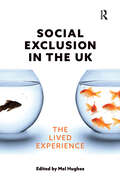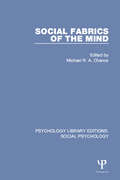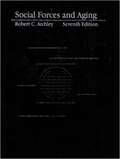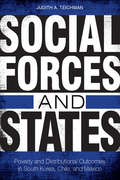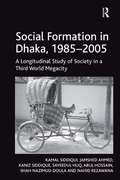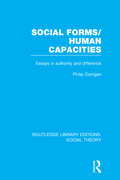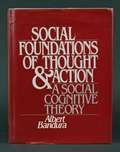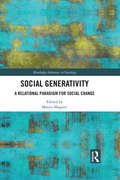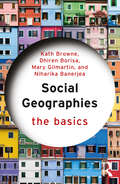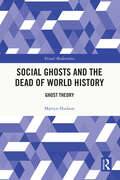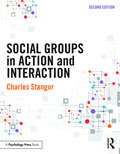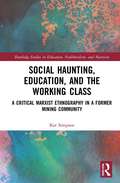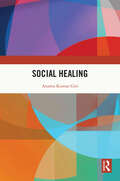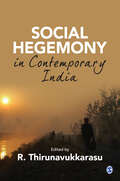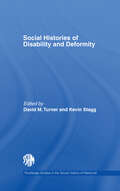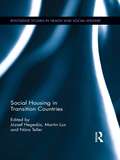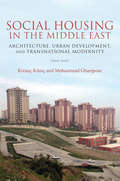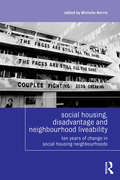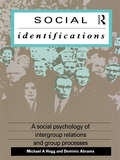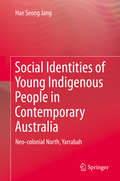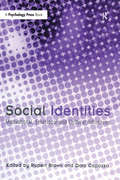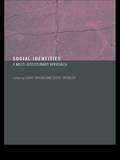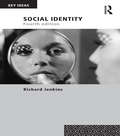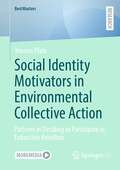- Table View
- List View
Social Exclusion in the UK: The lived experience
by Mel HughesIn UK society, there are cultural norms and assumptions that affect many marginalised groups and this book aims to address and challenge these through the lens of the people who have lived these experiences.Social Exclusion in the UK presents a range of lived experiences alongside a critical commentary on the impact of social stigma, exclusion and marginalisation on people's lives. This book's chapters are co-authored by people with lived experience and academics and are all underpinned by the Transformative Learning Theory developed by scholar Mezirow. The marginalised experiences discussed in this book include different types of substance users, care leavers, asylum seekers, offenders, HIV positive, those living in poverty or those who identify as transgender.What makes this book unique is that it gives a voice to those who have been the most affected by inequality - whether it's economic or social and health inequalities. Those affected are the least likely to be involved in shaping and informing responses to it and this lack of involvement risks the further exclusion of those who are already marginalised.A few of the ways this book aims to challenge this include: legitimising and prioritising lived experience expertise; fostering critical reflection of our own beliefs and assumptions and drawing on lived experience expertise to inform responses and solutions.
Social Fabrics of the Mind (Psychology Library Editions: Social Psychology #7)
by Michael R.A. ChanceOriginally published in 1988, this book outlines a new evolutionary paradigm for understanding human society and mental structure, originating from the editor's work in primate ethology. It is supported and further elaborated by the contributors. Chance argues that two modes of social interaction, the agonic and hedonic, underlie social life and corresponding mentality. In the agonic mode we are concerned with self-security and our attention is much taken up with being accepted by a group. This mode is based on a recently discovered state of inhibited (braked) mental arousal. Social behaviour is either authoritarian or authority subservient, and has a tendency to control or be controlled. It curbs intelligence and restricts personality development. In the hedonic mode we are freer to form a network of personal relationships that are typically mutually supportive. The hedonic mode leads to the development of self-confidence and a relaxed empathic and collaborative personality with intelligence enhanced. The volume will still be of interest to all concerned with human affairs including those working in ethology, primatology, anthropology, social psychology, psychiatry and political sociology.
Social First Brands: How Modern Brands Create Community, Loyalty, and Growth
by Tom MinerAs platforms come and go, features fall in and out of fashion and consumer preferences change, brands need to understand how to build social media strategies that transcend trends and create genuine connection. In Social First Brands, expert Tom Miner explores how brands who put their social media front and center in their marketing efforts are reaping the benefits, building genuine communities with their customers and developing true brand loyalty. With many brands seeing social media solely as a way to mass promote their products, brands who really put social at the front and center are able to connect with consumers in authentic ways creating audience empathy and emotional resonance. By understanding how social media speaks to human behavior, brands who put social first are able to move beyond quick wins and hacks and create genuine connections and conversations between brand and customer delivering real value. From understanding the steps for creating a social media strategy that is bespoke, choosing and developing the right personality for your brand on social media or understanding how to create content that is consistent, this book covers everything you need to know to ensure your brand's socials generate loyal fans. With real-world examples from companies such as Crocs, Stanley, Funko and Ryanair, use this book to ensure your social media strategy creates real impact.
Social Forces and Aging: An Introduction to Social Gerontology (7th Edition)
by Robert C. AtchleyThe first and most widely used interdisciplinary text, first published in 1972, SOCIAL FORCES AND AGING provides a comprehensive introduction to aging as a social process and to the contexts in which aging occurs. Examines both societal and individual aspects of aging and incorporates the most up-to-date research and theory from a broad base of disciplines and interests.
Social Forces and States: Poverty and Distributional Outcomes in South Korea, Chile, and Mexico
by Judith A. TeichmanWith the failure of market reform to generate sustained growth in many countries of the Global South, poverty reduction has become an urgent moral and political issue in the last several decades. In practice, considerable research shows that high levels of inequality are likely to produce high levels of criminal and political violence. On the road to development, states cannot but grapple with the challenges posed by poverty and wealth distribution. Social Forces and Statesexplains the reasons behind distinct distributional and poverty outcomes in three countries: South Korea, Chile, and Mexico. South Korea has successfully reduced poverty and has kept inequality low. Chile has reduced poverty but inequality remains high. Mexico has confronted higher levels of poverty and high inequality than either of the other countries. Judith Teichman takes a comparative historical approach, focusing upon the impact of the interaction between social forces and states. Distinct from approaches that explain social well-being through a comparative examination of social welfare regimes, this book probes more deeply, incorporating a careful consideration of how historical contexts and political struggles shaped very different development trajectories, welfare arrangements, and social possibilities.
Social Formation in Dhaka, 1985-2005: A Longitudinal Study of Society in a Third World Megacity
by Kamal Siddiqui Jamshed Ahmed Kaniz Siddique Sayeedul Huq Abul Hossain Shah Nazimud-Doula Nahid RezawanaBy the middle of the twenty-first century, more than fifty per cent of the world's population will live in an urban environment. Most of this new urban growth will take place in Asia and Africa, yet most governments in these two continents seem woefully unprepared for the challenges they will face in providing their urban citizens with the basic services and security from poverty, environmental degradation and crime. It is in this context that in-depth studies which lay bare the contours and characteristics of society and institutions in the urban setting of Third World countries assume importance and urgency. Most studies on urbanisation in developing countries concentrate on slums and shanty towns in isolation from the rest of the society. By contrast, Social Formation in Dhaka, 1985-2005 analyses urbanisation and urban society in a holistic manner, connecting the poor with the non-poor and delineating the change agents of the city. As the first longitudinal study of the social structure of any Third World Megacity, this book will be of interest to urban sociologists, policy-makers, NGOS, and researchers engaged in understanding the development in cities in the global south.
Social Forms/Human Capacities: Essays in Authority and Difference (Routledge Library Editions: Social Theory)
by Philip CorriganThis is an exhilarating book, written by one of sociology’s most imaginative theorists and critics. Professor Corrigan proceeds by turning old answers into new questions. He draws on a rich tradition of thought from sociology, philosophy, structuralism, post-structuralism, and literary criticism to explore major ongoing problems in everyday life: moral regulation, schooling, the capitalist world economy, intellectuals, and the problem of difference, masculinity. The result is one of the most dazzling contributions to critical sociology published in recent years.
Social Foundations Of Thought And Action: A Social Cognitive Theory (Prentice-hall Series In Social Learning Theory)
by Albert BanduraPresents a comprehensive theory of human motivation and action from a social-cognitive perspective. This insightful text addresses the prominent roles played by cognitive, vicarious, self-regulatory, and self-reflective processes in psychosocial functioning; emphasizes reciprocal causation through the interplay of cognitive, behavioral, and environmental factors; and systematically applies the basic principles of this theory to personal and social change.
Social Generativity: An Introduction (Routledge Advances in Sociology)
by Mauro MagattiThe 2008 economic crisis called into question the sustainability of the individualistic consumer society. However, for better or for worse, this long-term crisis represents an opportunity for the creation of a new model of growth to reform capitalism, structurally as well as culturally. As a contribution to this debate, Social Generativity offers a much-needed and original conceptual synthesis, within a unique anthropological focus on the forms of selfhood sustained by the historical and economic conditions of the present day. Encompassing four years of interdisciplinary empirical research based primarily on a sample of social groups, organizations and firms in Italy, this volume redefines the notion of "Social Generativity" from its pyschological origin (as formulated by Erik Erikson) to that of a social action that can be implemented during daily life and in different spheres of existence. A critical analysis of contemporary capitalism, this volume will appeal to postgraduate students and policy makers interested in fields such as Organisational Studies, Anthropological Theory, Social Change, Economic Sociology, Public Affairs and Business Ethics.
Social Geographies: The Basics (The Basics)
by Mary Gilmartin Kath Browne Niharika Banerjea Dhiren BorisaSocial Geographies: The Basics introduces what social geography is, and what it might be. It outlines the key contours of social geographies, and also disrupts some of the conventions of the discipline in both its content and structure.This book approaches social geographies by beginning with the resistances, contestations and ‘solutions’ that communities use to challenge exclusions in place and space in order to create equitable societies. It then addresses the inequalities, precarities, and ‘problems’ that prompt these interventions. This allows the book to emphasise the importance of activism in the here and now, and to show how activism often makes issues visible and contested in ways that are then theorised by academics. Social Geographies starts with solidarities, communities, and networks before moving to examine difference, precarity, and mobilities. Each chapter offers key case studies that centre resistance, contestations of inequitable power, and local knowledges that can often be seen as ‘solutions’ to national and transnational issues, creating a decolonial understanding of ‘social geography from below’ within and across national contexts.This book is essential reading for undergraduate students and readers new to the area, as well as anyone studying introductory geography, social, cultural and critical geography, ‘the spatial turn’ and issues of spatialities, and key issues like precarity, power, difference, equality, and mobilities.
Social Ghosts and the Dead of World History: Ghost Theory (Visual Modernities)
by Martyn HudsonSocial Ghosts and the Dead of World History looks at the global phenomena of the dead in world history, examining the phantasms and spirits of classical social science and philosophy. From Hegel’s ‘World-Spirit’ to Max Weber’s ‘Verstehen’ and Marx’s phantasms, there is a recurring obsession with the ‘spirits’ of modernity. This book explores the relationships and interactions between those spirits and materiality in five broad areas: the nature of the dead in modernity, shape-shifting and mobile souls, the spirit in accounts of prehistory and archaeology, the phenomenology of spirits and the relation to statues and stone, and the nature of spirit as it is manifested in wooden artefacts and folklore. It offers a counter-modernity to that of classical social science and philosophy and new ways of thinking about our crises and catastrophes in social theory and the world and the worlds beyond this world. Building on the author’s previous work on the sociology of haunted houses and landscapes, it examines the body and the individual as the locus of haunting. The book will appeal to academics in philosophy, history, social theory, anthropology and cultural studies in its omni-disciplinarity and in its import for rethinking the histories of social thought.
Social Groups in Action and Interaction: 2nd Edition (Psychology Ser.)
by Charles StangorSocial Groups in Action and Interaction reviews and analyzes the human group as it operates to create both social good and, potentially, social harm. It summarizes current knowledge and contemporary research, with real-world examples in succinct yet engaging chapters, to help students understand and predict group behavior. Unlike other texts, the book considers a wide range of topics--such as conformity, leadership, task performance, social identity, prejudice, and discrimination--from both an intragroup and an intergroup perspective. By looking at behavior both within and between groups, it bridges the gap between these interconnected approaches. The second edition is thoroughly updated to include new discussion of the biology and neuroscience of group formation, recent developments in social identity theory, and recent advances in the study of social networks. It also includes questions for review and discussion in the classroom. It provides the most comprehensive and essential resource for courses on group dynamics and behavior.
Social Haunting, Education, and the Working Class: A Critical Marxist Ethnography in a Former Mining Community (Routledge Studies in Education, Neoliberalism, and Marxism)
by Kat SimpsonBased on a critical Marxist ethnography, conducted at a state primary school in a former coalmining community in the north of England, this book provides insight into teachers’ perceptions of the effects of deindustrialisation on education for the working class. The book draws on the notion of social haunting to help understand the complex ways in which historical relations and performances, reflective of the community’s industrial past, continue to shape experiences and processes of schooling. The arguments presented enable us to engage with the ‘goodness’ of the past as well as the pain and suffering associated with deindustrialisation. This, it is argued, enables teachers and pupils to engage with rhythms, relations, and performances that recognise the heritage and complexities of working-class culture. Reckoning and harnessing with the fullness of ghosts is essential if schooling is to be refashioned in more encouraging and relational ways, with and for the working class. This text will benefit researchers, academics, and educators with an interest in the sociology of education, and social class and education in particular. Those interested in schooling, ethnography, and qualitative social research will also benefit from the book
Social Healing
by Ananta Kumar GiriSocial Healing draws on a transdisciplinary approach— bringing sociology, philosophy, psychology, and spirituality together — to understand health, social suffering, and healing in our contemporary world. It shows how we can transform the present discourse and reality of social suffering by multi-dimensional movements of social healing. The author argues for the need for a new art of healing in place of the dominant and pervasive technology and politics of killing. It discusses manifold creative theories and practices of healing in self, society, and the world as well as new movements in social theory, philosophy, and social sciences which deploy creative methods of art and performance in healing our psychic and social wounds. It explores the spiritual, social, ethical, and political dimensions of health and healing. This pioneering work will be of great interest to scholars and researchers of social theory, sociology, politics, philosophy, and psychology.
Social Hegemony in Contemporary India
by R. ThirunavukkarasuThis edited book offers insights into the social inequalities that plague India and are often hidden behind terms like ‘law and order’ and ‘constitutional democracy’. Though the market-driven economy was once expected to radically transform the heavily hierarchical Indian society into a more egalitarian order, the society remains unequal despite almost three decades of liberalization. Therefore, the liberal rhetoric of a democratic order and the free market guaranteeing social justice needs to be reappraised. Social Hegemony in Contemporary India demonstrates how socially privileged sections after acquiring and consolidating power at an alarming rate are now even more dominant over the lives of common Indians than at any time after 1947. Consequently, many communities—like Dalits and other neglected minorities—have been disempowered and pushed to the margins. Any resistance to the dominant social order and its status quo is punished through ostracization and violence. The mission for social justice, therefore, needs a fresh approach and actionable change from those who aspire for a truly liberated India, unshackled from inequity and bias.
Social Histories of Disability and Deformity: Bodies, Images and Experiences (Routledge Studies in the Social History of Medicine #Vol. 25)
by Kevin Stagg David M. TurnerCollecting together essays written by an international set of contributors, this book provides an important contribution to the emerging field of disability history. It explores changes in understandings of deformity and disability between the sixteenth and twentieth centuries, and reveal the ways in which different societies have conceptualised the normal and the pathological. Through a variety of case studies including: early modern birth defects, homosexuality, smallpox scarring, vaccination, orthopaedics, deaf education, eugenics, mental deficiency, and the experiences of psychologically scarred military veterans, this book provides new perspectives on the history of physical, sensory and intellectual anomaly. Examining changes over five centuries, it charts how disability was delineated from other forms of deformity and disfigurement by a clearer medical perspective. Essays shed light on the experiences of oppressed minorities often hidden from mainstream history, but also demonstrate the importance of discourses of disability and deformity as key cultural signifiers which disclose broader systems of power and authority, citizenship and exclusion. The diverse nature of the material in this book will make it relevant to scholars interested in cultural, literary, social and political, as well as medical, history.
Social Housing in Transition Countries (Routledge Studies in Health and Social Welfare #10)
by József Hegedüs Nóra Teller Martin LuxThis volume intends to fill the gap in the range of publications about the post-transition social housing policy developments in Central and Eastern Europe by delivering critical evaluations about the past two decades of developments in selected countries’ social housing sectors, and showing what conditions have decisively impacted these processes. Contributors depict the different paths the countries have taken by reviewing the policy changes, the conditions institutions work within, and the solutions that were selected to answer the housing needs of vulnerable households. They discuss whether the differences among the countries have emerged due to the time lag caused by belated reforms in selected countries, or whether any of the disparities can be attributed to differences inherited from Soviet times. Since some of the countries have recently become member states of the European Union, the volume also explores whether there were any convergence trends in the policy approaches to social housing that can be attributed to the general changes brought about by the EU accession.
Social Housing in the Middle East: Architecture, Urban Development, and Transnational Modernity
by Mohammad Gharipour Kıvanç KılınçAs oil-rich countries in the Middle East are increasingly associated with soaring skyscrapers and modern architecture, attention is being diverted away from the pervasive struggles of social housing in those same urban settings. Social Housing in the Middle East traces the history of social housing—both gleaming postmodern projects and bare-bones urban housing structures—in an effort to provide a wider understanding of marginalized spaces and their impact on identities, communities, and class. While architects may have envisioned utopian or futuristic experiments, these buildings were often constructed with the knowledge and skill sets of local workers, and the housing was in turn adapted to suit the modern needs of residents. This tension between local needs and national aspirations are linked to issues of global importance, including security, migration, and refugee resettlement. The essays collected here consider how culture, faith, and politics influenced the solutions offered by social housing; they provide an insightful look at how social housing has evolved since the 19th century and how it will need to adapt to suit the 21st.
Social Housing, Disadvantage, and Neighbourhood Liveability: Ten Years of Change in Social Housing Neighbourhoods (Housing and Society Series)
by Michelle NorrisIn a groundbreaking longitudinal study, researches studied seven similar social housing neighbourhoods in Ireland to determine what factors affected their liveability. In this collection of essays, the same researchers return to these neighbourhoods ten years later to see what’s changed. Are these neighbourhoods now more liveable or leaveable? Social Housing, Disadvantage and Neighbourhood Liveability examines the major national and local developments that externally affected these neighbourhoods: the Celtic tiger boom, area-based interventions, and reforms in social housing management. Additionally, the book examines changes in the culture of social housing through studies of crime within social housing, changes in public service delivery, and media reporting on social housing. Social Housing, Disadvantage and Neighbourhood Liveability offers a new body of data valuable to researchers in Ireland and abroad on how to create more equitable and liveable social housing.
Social Identifications: A Social Psychology of Intergroup Relations and Group Processes
by Michael A. Hogg Dominic AbramsThe authors of Social Identifications set out to make accessible to students of social psychology the social identity approach developed by Henri Tajfel, John Turner, and their colleagues in Bristol during the 1970s and 1980s. Michael Hogg and Dominic Abrams give a comprehensive and readable account of social identity theory as well as setting it in the context of other approaches and perspectives in the psychology of intergroup relations. They look at the way people derive their identity from the social groups to which they belong, and the consequences for their feelings, thoughts, and behaviour of psychologically belonging to a group. They go on to examine the relationship between the individual and society in the context of a discussion of discrimination, stereotyping and intergroup relations, conformity and social influence, cohesiveness and intragoup solidariy, language and ethnic group relations, and collective behaviour. Social Identifications fills a gap in the literature available to students of social psychology. The authors' presentation of social identity theory in a complete and integrated form and the extensive references and suggestions for further reading they provide will make this an essential source book for social psychologists and other social scientists looking at group behaviour.
Social Identities of Young Indigenous People in Contemporary Australia
by Hae Seong JangThis volume is about the social identities of young Indigenous people in contemporary Australia, based on fieldwork in the rural community of Yarrabah, in Queensland. This case study of Yarrabah is based on seventeen ethnographic interviews with women and men in their twenties. With the aim of exploring how diverse social discourses have influenced the social identities of young Indigenous people in contemporary Australia, this book represents the life histories of these young people in Yarrabah in the context of both the institutions with which they interact and the everyday shape of life in Yarrabah. This volume also provides new material for discussion of the ways in which Indigenous value systems, broadly understood by the participants to be based on collectivism, constantly come into conflict with Western values based on individualism. While the young Indigenous people of Yarrabah do continuously interact not only with multi‑cultural Australia but also with global influences, they are constantly aware of their own distinctiveness in both contexts.
Social Identities: Motivational, Emotional, Cultural Influences (European Monographs In Social Psychology Ser.)
by Rupert Brown and Dora CapozzaThe concept of social identity occupies a central position in contemporary social psychology. Social Identities: Motivational, Emotional, Cultural Influences reports recent developments in the analysis of motivational and affective aspects of social identity processes. The book also examines the cross-cultural generality of Social Identity Theory explanations of intergroup competitiveness, which have strongly influenced international research in this area. People’s social identities and self-evaluation are thought to be largely derived from group memberships; it is presumed that people are motivated to attain positivity in these identities by favouring the ingroup in intergroup comparisons. An increasing stream of research is being devoted to extending the applicability of social identity concepts to intergroup relations and related fields. The editors present here a collection of contributions from leading figures in social psychology which explore the state of the art in social identity theory. The most prominent motivational theories of identification are reported. Central themes concern: motivations which lead individuals to join a group and identify with it the role emotions have in favouring (or hindering) intergroup relations the effect of emotions on intergroup behaviour how people react to social identity threats Shedding new light on important social problems like prejudice, bigotry, and intense conflicts around the world, this unique volume will be indispensable to students and researchers of social psychology, sociology and cultural studies.
Social Identities: Multidisciplinary Approaches
by Gary Taylor Steve SpencerSocial Identities: Multidisciplinary Approaches attempts to make sense of the increasingly complex ways in which we define ourselves and others. It recognises that we are not simply individuals, or members of a certain class or a certain nationality. Rather, each of us comprises a rich blend of various identities.The book provides not only an eclectic spectrum of the forms of identity and influences through which identities are formed, but also critical treatment of the theoretical tools used to understand these phenomena.
Social Identity (Key Ideas)
by Richard JenkinsSocial Identity explains how identification, seen as a social process, works: individually, interactionally and institutionally. Building on the international success of previous editions, this fourth edition offers a concise, comprehensive and readable critical introduction to social science theories of identity for advanced undergraduates and postgraduates. All the chapters have been updated, and extra new material has been added where relevant, integrating the most recent critical publications in the field. As with the earlier editions, the emphasis is on sociology, anthropology and social psychology; on the interplay between relationships of similarity and difference; on interaction; on the categorisation of others as well as self-identification; and on power, institutions and organisations. Written in clear, accessible language, and informed by relevant topical examples throughout, this fully updated new edition will be useful for students interested in social identity throughout the social sciences and humanities.
Social Identity Motivators in Environmental Collective Action: Patterns in Deciding to Participate in Extinction Rebellion (BestMasters)
by Yvonne PlateSocial Identity research has found prominence in the realm of collective action but lacks an environmental activism focus. This study gathers individuals’ experiences to explore the influences on decision-making processes to join an environmental activist group – the local Extinction Rebellion (XR) group in Stuttgart, Germany. This case study is used to identify patterns in this process, to test the applicability of existing models and to explore the significance of social identity. Activists and past activists were interviewed. The results make it apparent that the existing models are not sufficient to represent social identity processes in environmental activism. The findings are visualized in a suggested adjusted model of collective action, which suggests norms and morals and (politicized) social identity as a twin core influencing collective action. Social identity retains its significance at the center of the model. Furthermore, it is suggested that collective efficacy beliefs and a sense of agency are interchangeable factors influencing the twin core and collective action directly. Injustice perceptions remain essential. Social connections, group identification, group dynamics, participatory efficacy, self-identity, and image are found to play a role occasionally but require further investigation. The convergence of collective efficacy beliefs and a sense of agency and the valuation of factors present especially relevant future research topics.
